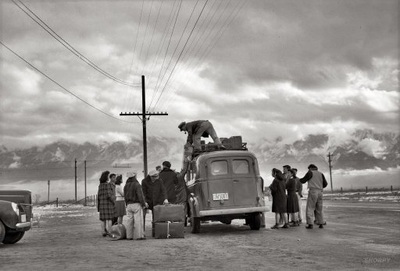

In April 1972, thirty years after her family's humiliation and loss of livelihood, Jeanne Houston takes her three children to visit the skeletal remains of Manzanar. The first Wakatsuki to gain a college degree, she marries James D. Jeanne rebels against Ko's strict traditionalism by serving as a majorette and being elected homecoming queen. In 1951, the family moves to the Santa Clara Valley, where Ko returns to farming and raises strawberries. Mama works in a fish cannery Ko is unable to find work commensurate with his need for self-esteem. The family locates an apartment in Cabrillo Homes, a flimsy housing project in west Long Beach. Later, to prove his sense of manhood, Ko rejects leaving Manzanar in a bus and returns his clan two hundred and twenty-five miles to Long Beach via three round trips in a blue, used Nash automobile. Many young men, including Woody, disagree with the older generation and sign up for the military as a means of proving their loyalty. Jeanne enjoys normal school experiences, including participation in glee club and yearbook activities.Ĭamp life grows difficult as a result of pro-Japanese riots and forced loyalty oaths. In spring 1943, the family locates better accommodations at Block 28, where Ko develops optimism through cultivating pear trees. Jeanne avoids family disorder by hiding under the bed, studying catechism, playing hopscotch, and learning ballet. The family, overcrowded and miserable in Block 16, endures unappetizing institutional food, dust storms, diarrhea, lack of privacy, foul toilets, and annoying, impersonal red tape.Īfter his reunion with his family in September 1942, Ko escapes feelings of humiliation through the consumption of homemade rice wine and becomes an angry, bitter, drunken recluse. The Wakatsukis, with Jeanne's brother Woody at the head, are transported to Owens Valley, California, home of 10,000 internees. In February 1942, President Roosevelt issues Executive Order 9066 ordering Japanese-Americans to evacuate their homes and take up residence in internment camps. FBI agents arrest Jeanne's father, Ko, for allegedly supplying oil to Japanese submarines and imprison him at Fort Lincoln, near Bismarck, North Dakota. On Sunday, December 7, 1941, in Long Beach, California, the family - consisting of both parents, Jeanne's four brothers and five sisters, and Granny - are startled by news that Japan has attacked Pearl Harbor, Hawaii. Beginning with a foreword and a time line, Farewell to Manzanar contains an autobiographical memoir of Jeanne Wakatsuki Houston's wartime incarceration at Manzanar, a Japanese-American internment camp.


 0 kommentar(er)
0 kommentar(er)
